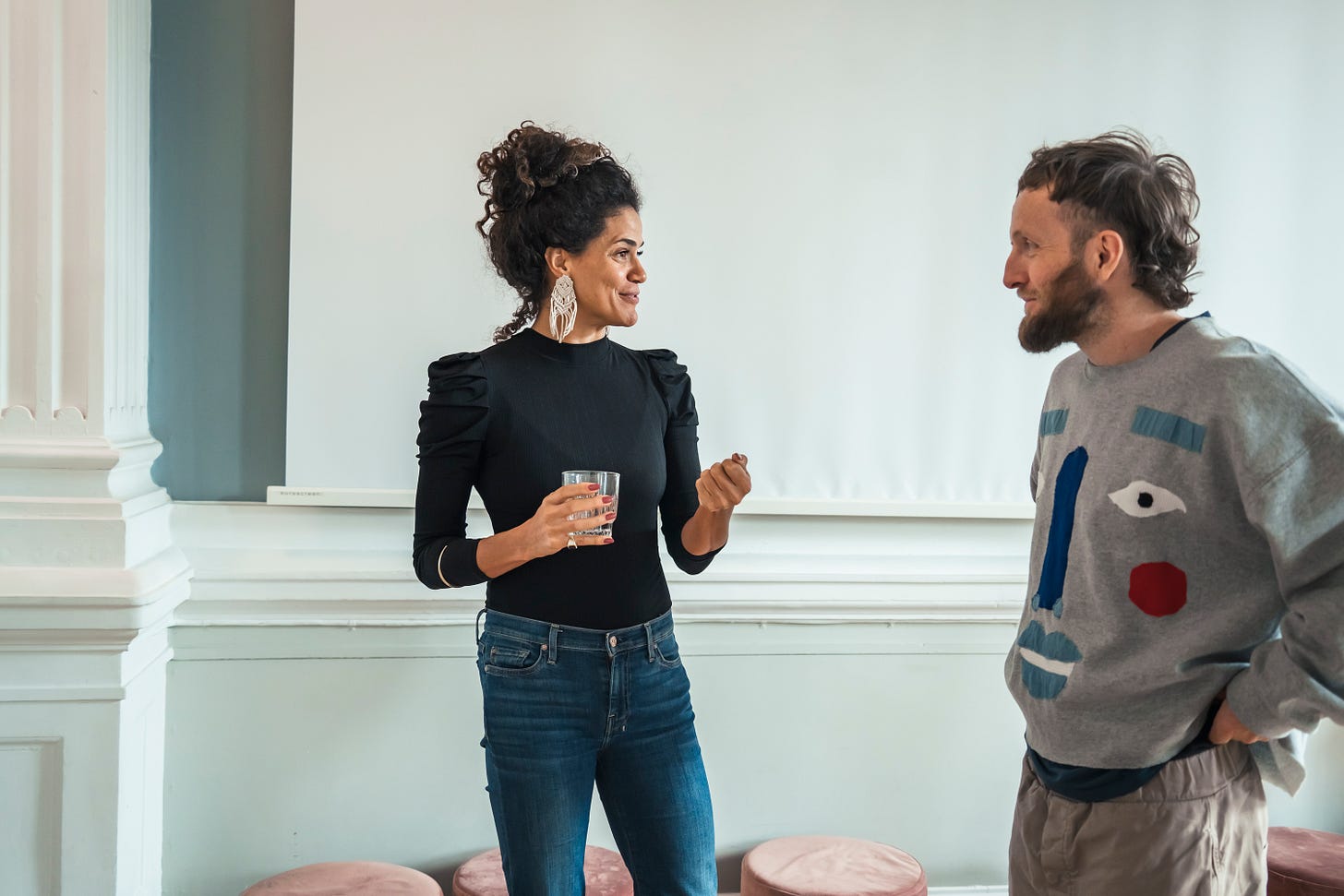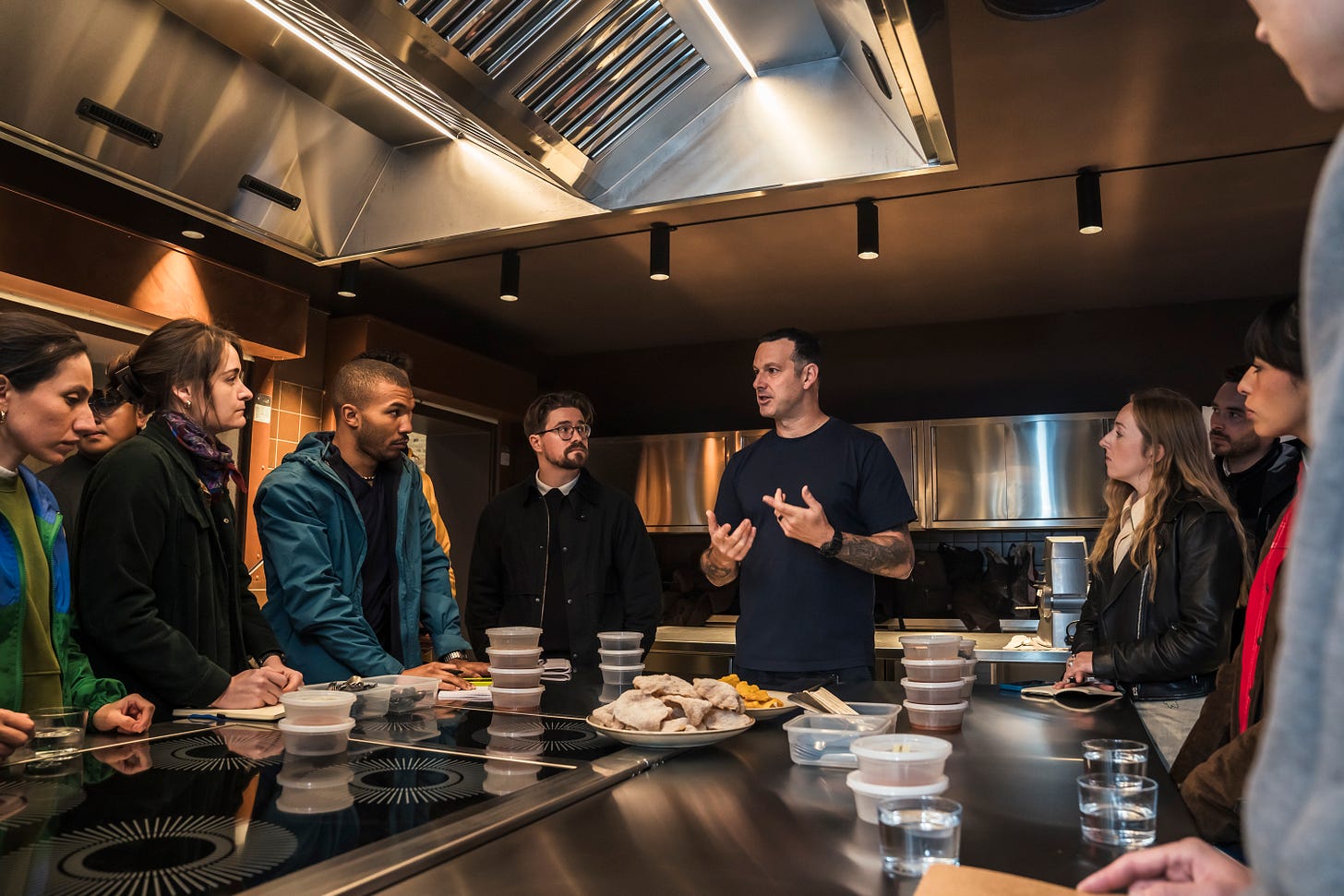The Seed of an Idea
A new MAD initiative harnesses the power of chefs for a better vegetable future. Plus glimpses of Academy 2025, and a Save the Date for our SoCal community
Søren Ejlersen’s bid to change the world–or at least Danish agriculture–started with a kilo-bag of carrot seeds.
As the co-founder of Aarstiderne, a Danish company that supplies subscriptions of organic produce to consumers in Scandinavia, Søren thinks a lot about how to get people excited about vegetables. So when the creator of a New Mexico seed bank offered him what he promised were some amazing carrots, Søren happily—if a little skeptically— planted the seeds in Aarstiderne’s test gardens. A couple of months later, he was astonished to see the root vegetables coming in, not only in the normal orange, but in yellow, purple, and red as well.
This was in 2001, and rainbow carrots were a novelty in Denmark. As a chef himself, Søren was quick to see their potential, especially after testing proved that the colored carrots were not only trippy to look at, but highly nutritious as well. Aarstiderne began including them in the boxes they sent to their customers. But a collaboration with a Danish supermarket chain to distribute them more broadly failed several times, basically because people were too scared to buy them. “Now you can find them all over Denmark,” Søren says of the multi-hued root vegetables. “But it took ten or fifteen years for them to get there.”
He’s convinced, though, that the whole process could have happened sooner if there had been more chefs involved. Which is why, late this summer, he told the story of the amazing bag of technicolor seeds at the inaugural meeting of a new MAD initiative called Seed Chefs.
Simply put, Seed Chefs is bringing together chefs, farmers, and seed producers to collaborate on a better vegetable future. By leveraging chefs’ deep understanding of deliciousness, the program seeks to revive old plants and generate new ones, but that’s only the beginning. It is also building a network that aims to work all along the supply chain to ensure a market for the newly-introduced vegetables, a revenue stream for the farmers who grow them, and a more biodiverse agriculture.
Chefs working closely with farmers to supply their own restaurants is nothing new of course; entire Portlandia sketches have been built around the phenomenon. But what distinguishes Seed Chefs—which is currently focused Denmark but could serve as a model for collaborations around the world– is the scope: it’s not just about finding better tasting vegetables (although that in itself is a huge deal). It’s also about looking at the whole big picture of how food is grown, distributed, and consumed and saying: hey, you know who could really bring something useful to this conversation? Chefs.
As a program, Seed Chefs roams wide for its inspiration, from Mexican chef Thalía Barrios who works closely with farmers in the Oaxaca Valley that cultivate the heritage varieties of corn that she serves at her Michelin-starred restaurant Levadura de Olla, to Indian chef Ranveer Brar who has helped create a market among consumers for millet and other grains traditional to the subcontinent. One early spark came from chef Joan Roca of the three-star El Celler de Can Roca, who, together with his brothers Josep and Jordi, set out to find the especially tasty variety of beans their mother used to enjoy as a child. The quest led them north—far north. Inside the Global Seed Vault on the Norwegian island of Svalbard, way above the Arctic Circle, they found the variety they had been searching for, brought home a few examples, and worked with a local farmer in Girona, Spain to grow the beans. Within a short while, they were able to present their mom with a taste of her childhood.
At the time, Lisa Lykke Steffensen was director of the Seed Vault, and she recalls being surprised by the request. “We got visits all the time from journalists and scientists,” Lisa says. “But this was the first time a chef wanted to come. And no one had ever asked about deliciousness before.”
(Can we pause for a moment to consider how crazy that is? The largest and most diverse collection of crop seeds in the history of the world and no one had thought about how they tasted?)
The Roca brothers had tapped into an obvious, but overlooked, resource for flavor, and one that Seed Chefs plans to tap into–without necessarily trekking to the Arctic. There are seed banks all over the world, Søren points out, and they are all “filled with the magic stuff that people either don’t grow anymore or don’t even know actually exists.”
But with bigger goals than just satisfying matriarchal nostalgia, Seed Chefs is also looking to examples like Pierre Thiam for how to achieve maximum impact. Born in Senegal, Pierre is the executive chef of Nok by Alara in Lagos and fast-casual restaurant Teranga in New York, and he’s also the author of leading English-language cookbooks on West African cuisine. When he was writing the first one, he frequently found himself searching for substitutions, because many African ingredients weren’t available in the US. “At the same time,” he says, “I realized that one of the reasons Africa remains a net food importer is that our own indigenous crops are too often neglected and underutilized.” An opportunity began to take shape in his mind. “If we could find a way to promote these crops and support the farmers who grow them, we could begin to shift this story.”
The result was Yolélé, an enterprise that works with West African farmers to bring local ingredients to a global audience. Its first product was fonio, an ancient grain that checks a lot of boxes: nutty-tasting and quick-cooking; easy to grow with deep roots that restore soil; and culturally significant for the Dogon, who consider it “the seed of the universe.” It was clear to Pierre that it represented a huge opportunity. “Smallholder farmers in Africa are among the poorest people in the world, yet the crops they cultivate are some of the most resilient, nutritious, and climate-friendly,” he says. Making them accessible to a wider public would be “a triple win: a win for farmers, who would gain access to new markets; a win for the environment, since these crops are drought-resistant and grown in regenerative systems. And a win for consumers, who get access to a greater diversity of healthy, flavorful foods.”
By now, Yolélé not only supplies ingredients for Thiam’s restaurants, but with its retail arm, supports more than 700 farming families. It’s launched new products, like fonio chips and even, in collaboration with Brooklyn Brewery, a fonio beer. And it is expanding to other crops because, Pierre says, “we wanted to support farmers in maintaining their traditional methods of agriculture systems rooted in multi-cropping and crop rotation. We weren’t interested in promoting monoculture, but in strengthening the biodiversity that has always been at the heart of these resilient farming practices.”
Perhaps the greatest inspiration of all comes from Row 7, the seed innovation company founded by Dan Barber, the chef and co-owner of Blue Hill at Stone Barns restaurant in upstate New York (and MAD2 speaker!). Unlike other chef-led projects that focus on recovering old varieties, Row 7 works with plant breeders to develop new vegetables–ones that put flavor, rather than yield, first. The company models the kind of three-part collaboration that Seed Chef hopes to generate: some 175 chefs around the world, including powerhouses like Alain Passard, Mashama Bailey, Daniel Berlin, and Elena Reygadas help identify varieties with extraordinary flavor profiles; the plant breeders use cross-breeding (not genetic modification) to stabilize and accentuate those traits; and the farmers test the seeds in real growing conditions. The seeds that pass all three tests make it to market, including via a partnership with the Whole Food supermarket chain in the United States.
The collaboration has produced some legit blockbusters, like the velvety koginut squash and the sweetly pungent garleek, the love child of two alliums from opposite sides of the track. For all their trendiness, however, their purpose is serious; they and the other seeds Row7 produces are meant to help change food systems literally from the ground up. And with that kind of ambition, simply protecting heirloom varieties and planting heirloom seeds isn’t enough.
“As a reformed evangelist for heirlooms, I understand why you would go there, because that’s where the flavor is,” Dan says. “But the reason heirlooms have that flavor–the reason why our grandparents saved those seeds in the first place–is because the genetics and the environment conspired to produce a delicious plant in a specific place and time. And you can’t mummify that: the environment changes, diseases change, the soil changes, and God knows the climate changes.”
That’s why Row7 looks to plant breeders to select for traits that are both delicious (which, Dan says, is inseparable from being nutritious) and well-suited for growing at scale in current conditions. “If we don’t want to be just producing delicious vegetables for the 1%,” Dan says, “we need to take what we love about heirlooms and advance them.”
Armed with all those different pieces of inspiration and experience, the Seed Chefs project aims to have its own broad impact in Denmark. As Søren Ejlersen points out, that can’t happen fast enough: with 40% of the country’s farms closing down in the last decade, and the total number of hectares devoted to raising food crops is shrinking fast, Danish agriculture sorely needs the help. “It’s not enough for noma to work with one farm, or Geranium to work with another,” he says of two of Copenhagen’s most prominent examples. “Those projects are cool, but they don’t solve enough. We need to be more systematic.”
At his suggestion, the Seed Chef project is considering a project that would have the consortium identify five or so varieties and then introduce them via several vectors at once. “We have a system in place for retail, and another to teach kids in school about them,” he says. “Then you add in some elite chefs, and they’re not only using them in their restaurants and talking about them with their customers, but maybe they’re forming a partnership with a big hotel chain, or with canteens. That could convince the big supermarkets to take the leap.”
The chefs, in other words, are critical. “If they come in and inspire all the others to move forward, it could give the farmers the security they need to grow these vegetables. We could actually rescue Danish vegetable production.”
So watch this space. Seed Chefs held a second meeting in September (there, participants heard both from chef—and MAD7 speaker!—Emilie Qvist about how a carrot she served in her restaurant inspired a guest to seek it out from the farm that grew it and from grower Axel Munsen how small farmers like him spend 75% of their time just trying to sell their vegetables), and will hold three more before the end of the year.
And throughout, they’ll be keeping in mind a core idea, beautifully expressed by Pierre Thiam, that applies not just to Denmark, but to the whole world. “Chefs and agriculture, “ he said, “should be inseparable.”
WHAT WE’VE BEEN UP TO
MAD Academy 2025
We’ve just wrapped two incredible weeks of MAD Academy that saw ninety eager, curious, and determined-to-make-a-difference students from around the world come to Copenhagen for our course on Environment and Sustainability. Along the way, they heard from Douglas McMaster about “why waste is a failure of imagination,” and learned how Chantelle Nicholson ensured that “no chef should have to give up everything to work” at her London restaurant Apricity. They also sampled coffee vinegar at Matt Orlando’s yet-to-open new restaurant, checked out some Greenlandic ice cores, and debated the meaning of words like ‘carbon footprint’ and ‘organic.’ Throw in a lot of good food and and a lot of new friendships, and it made for a memorable—and impactful—couple of weeks. We’ll have more on Academy soon, but for now we’ll leave you with a few snapshots and this takeaway from one student: “Be generous with your knowledge. It’s your superpower.”
Save the Date: MAD Monday in Los Angeles
On November 10, MAD brings its signature blend of high-octane ideas and community-building connection to Los Angeles. For our next MAD Monday, we’re inviting some of SoCal’s leading local voices for a conversation about Borders, and how they shape the way food moves through our world: who grows it, who cooks it, who serves it, and who gets to enjoy it.
Follow us on Instagram for more information and how to purchase tickets—coming later this week.









You all should get in touch with Lane Selman from Culinary Breeding Network. She's been doing this work for more than 10 years now. She has a lot of experience doing this work with academic & industry collaborators alongside chefs as well as community engagement on a large scale. She would be an invaluable resource for you as you build on this new initiative.
100% you gotta include Culinary Breeding Network when talking about seed for flavor! As a farmer their work has been instrumental to our success!